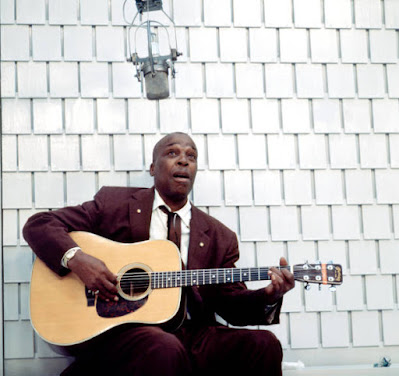"Skip" James (June 9, 1902 – October 3, 1969) was an American Delta blues singer, guitarist, pianist and songwriter.
Nehemiah Curtis James was born on June 9, 1902, in a segregated hospital near Bentonia, Mississippi His mother Phyllis worked as a cook and babysitter on the Woodbine Plantation, which was 15 miles south of Yazoo City. His father Eddie James, a bootlegger who was described as a "local lowlife" by Stephen Calt, left the family around 1907. He later reformed and became a preacher. As a youth, James heard local musicians, such as Henry Stuckey, from whom he learned to play the guitar, and the brothers Charlie and Jesse Sims. His mother bought him a $2.50 guitar, which was his first instrument. James later began playing the organ in his teens. He later left Bentonia in 1919, and began working on road construction and levee-building crews in Mississippi in the early 1920s, and wrote what is perhaps his earliest song, "Illinois Blues", about his experiences as a laborer. He began playing the guitar in open D-minor tuning.
For most of the 1920s, James worked a series of illicit jobs, such as bootlegging, gambling, and procuring. In 1929, he met a local musician named Johnny Temple, who became his first protégé. The 23 year old Temple learned how to play in cross-note tuning, which was then unknown to musicians who were from the Jackson area, and also attempted to copy James' high falsetto voice, until he advised Temple to sing in his natural voice. James also operated a music school for would-be blues musicians in Jackson, giving lessons on guitar, piano, and even violin.
James continued working locally as a street singer. In early 1931, James auditioned for the record shop owner and talent scout H. C. Speir in Jackson, Mississippi. Speir placed blues performers with various record labels, including Paramount Records. On the strength of this audition, James traveled to Grafton, Wisconsin, to record for Paramount. His 1931 records are considered idiosyncratic among prewar blues recordings and formed the basis of his reputation as a musician.
As was typical of his era, James recorded various styles of music such as blues, spirituals, cover versions, and original compositions, frequently blurring the lines between genres and sources. For example, "I'm So Glad" was derived from a 1927 song, "So Tired", by Art Sizemore and George A. Little, recorded in 1928 by Gene Austin and by Lonnie Johnson (Johnson's version was entitled "I'm So Tired of Livin' All Alone"). James's biographer Stephen Calt, echoing the opinion of several music critics, considered the finished product totally original, "one of the most extraordinary examples of fingerpicking found in guitar music".
Several other recordings from the Grafton session, such as "Hard Time Killing Floor Blues", "Devil Got My Woman", "Jesus Is a Mighty Good Leader", and "22-20 Blues" (the basis of Robert Johnson's better-known "32-20 Blues"), have been similarly influential. Very few original copies of James's Paramount 78 rpm records have survived.
 |
| Skip with Son House |
The Great Depression struck just as James's recordings were hitting the market. Sales were poor as a result, and he gave up performing the blues to become the choir director in his father's church. James was later an ordained minister in Baptist and Methodist churches, but the extent of his involvement in religious activities is unknown. For the next thirty-three years, James made no known recordings and performed sporadically. He was virtually unknown to the general public. Blues singer and guitarist Big Joe Williams believed that James had already passed, having been murdered in Mississippi. In 1964, blues enthusiasts John Fahey, Bill Barth, and Henry Vestine found him in a hospital in Tunica, Mississippi. According to Calt, the "rediscovery" of both James and Son House at virtually the same time was the start of the blues revival in the United States.
In July 1964, James and other rediscovered musicians appeared at the Newport Folk Festival. Several photographs by the blues promoter Dick Waterman captured this performance, James's first in over 30 years. James subsequently recorded for Takoma Records, Melodeon Records, and Vanguard Records and performed at various engagements until his death from cancer on October 3, 1969, in Philadelphia, Pennsylvania, at the age of 67.
The British rock band Cream recorded "I'm So Glad", which provided James with $10,000 in royalties, the only windfall of his career. Only 15 copies of James' original shellac 78 recordings are still in existence, and have become extremely sought after by collectors. James was honored with a marker on the Mississippi Blues Trail in Bentonia, his hometown. In 2020, James' song "Devil Got My Woman" was added to the Grammy Hall of Fame
(Edited from Wikipedia)








4 comments:
Skip James – Devil Got My Woman – Grafton, Wisconsin, February 1931 (2024 Jasmine)
https://pixeldrain.com/u/rSzpxQog
1. HARD TIME KILLIN’ FLOOR BLUES
2. CHERRY BALL BLUES
3. 22-20 BLUES
4. IF YOU HAVEN’T GOT ANY HAY, GET ON DOWN THE ROAD
5. ILLINOIS BLUES
6. YOLA MY BLUES AWAY
7. HOW LONG BUCK
8. LITTLE COW AND CALF IS GONNA DIE BLUES
9. DEVIL GOT MY WOMAN
10. CYPRESS GROVE BLUES
11. I’M SO GLAD
12. SPECIAL RIDER BLUES
13. HARD LUCK CHILD
14. FOUR O’CLOCK BLUES
15. BE READY WHEN HE COMES
16. JESUS IS A MIGHTY GOOD LEADER
17. DRUNKEN SPREE
18. WHAT AM I TO DO BLUES
A big thank you goes to Summer Souvenir for the loan of this album (in Flac)
Nice post. Thank you.
Wonderful, thank you BB.
Great thx BB
Post a Comment